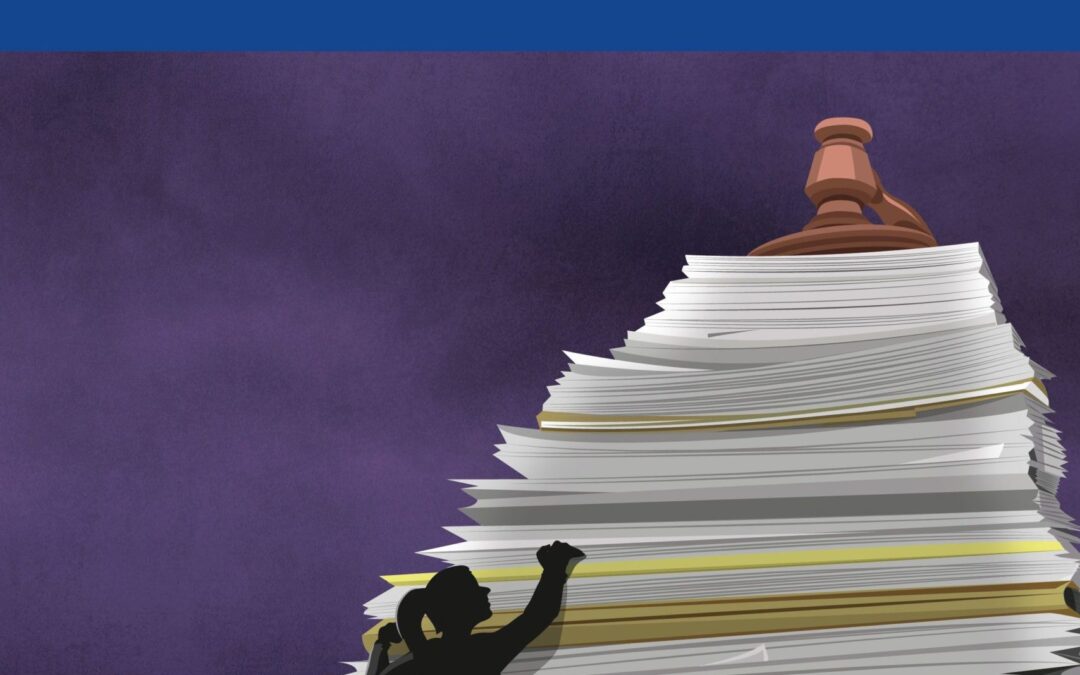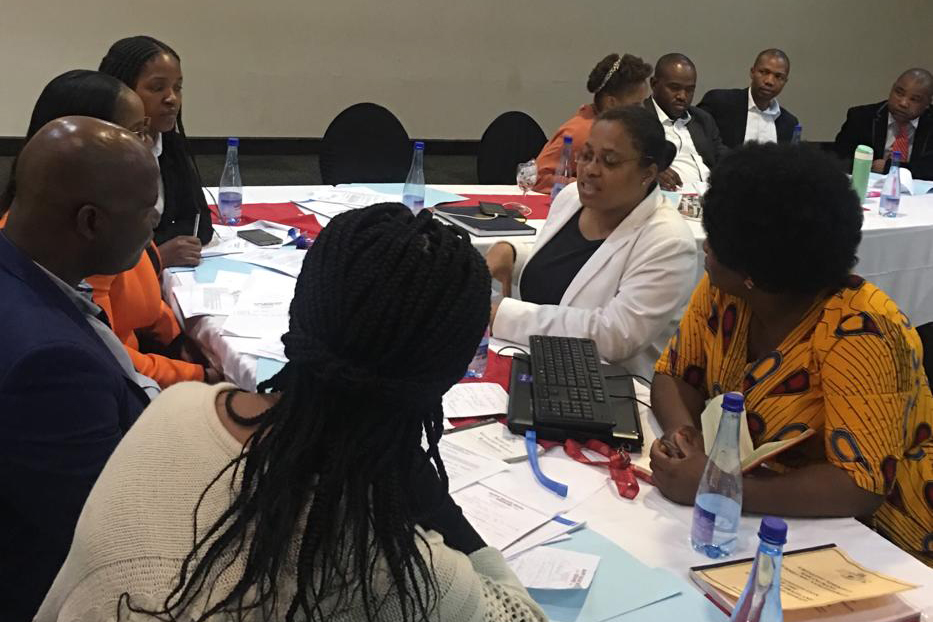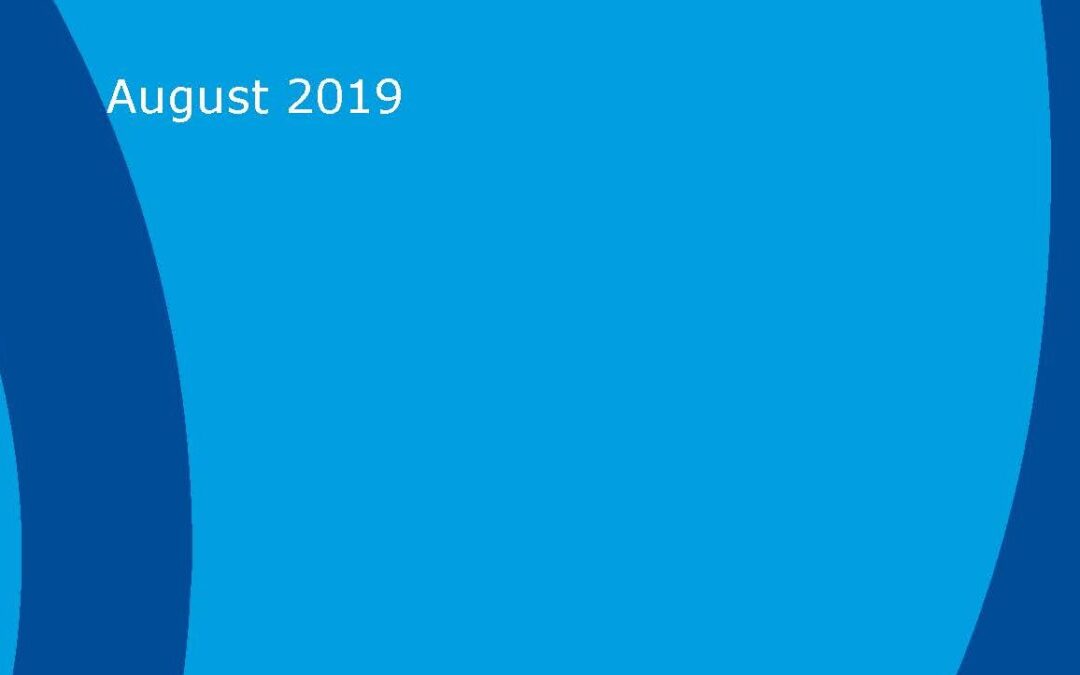
Mar 5, 2021
Today, the ICJ published Terrorism offences and human rights in the EU: a short guide aimed at supporting civil society and others advocating for the human rights of people affected by terrorism and counter-terrorism
Across Europe, national laws criminalise a wide range of conduct in the name of countering terrorism. In practice, these laws can affect rights to freedom of movement, expression, association, assembly, privacy, private and family life or the right to political participation. They may be applied in a way that is discriminatory, or through processes involving insufficient procedural safeguards that affect the right to liberty or the right to a fair trial..
This short Guide presents an overview of the international and EU legal framework for the protection of human rights in the application of terrorism-related criminal offences in EU Member States. It particularly addresses the impact on human rights of investigating, prosecuting and trying offences under the EU Directive on combatting terrorism.
The Guide outlines the scope of conduct considered as “terrorism” in international and EU law, as well as international law and standards on the rights of victims of terrorism and of suspects of terrorism-related crimes.
It summarises how international human rights law applies to counter-terrorism criminal law, including in times of crisis, in accordance with principles of legality, necessity and proportionality, and non-discrimination.
The Guide is complemented by the more detailed legal analysis of these issues in Counter-terrorism and human rights in the courts: guidance for judges, prosecutors and lawyers on application of EU Directive 2017/541 on combatting terrorism (the Guidance), published by the ICJ in collaboration with Human Rights in Practice, Nederlands Juristen Comité voor de Mensenrechten (NJCM) and Scuola Superiore Sant’Anna di Pisa in November 2020 as part of the EU JUSTICE project.
Download here: Terrorism offences and human rights in the EU: a short guide
Contact:
Róisín Pillay, Director Europe and Central Asia Programme; roisin.pillay(a)icj.org
Karolína Babická, Legal adviser Europe and Central Asia Programme; karolina.babicka(a)icj.org

Oct 22, 2020
In a publication released today, the ICJ called on the Lebanese authorities to remove obstacles and eradicate harmful practices in the administration of justice impeding the realization of women’s and girls’ access to justice for sexual and gender-based violence (SGBV).
This includes ensuring the rights of victims to an effective remedy and reparation, and by combatting the prevailing impunity in the country for such offences.
The report Accountability for Sexual and Gender-Based Violence in Lebanon: Guidance and Recommendations for Criminal Justice Actors (available in English and Arabic) concludes that legislative and procedural gaps within the Lebanese framework for the investigation, prosecution and adjudication of SGBV offences foster and perpetuate a systematic denial of effective legal protection and access to justice and effective remedies for women and girl victims of SGBV.
Moreover, the inadequacy of criminal justice responses to SGBV victims has been compounded by the 2020 Coronavirus pandemic, with studies finding that SGBV has surged amid government-imposed confinement measures.
Recalling the recommendations issued in its July 2019 report, Gender-based Violence in Lebanon: Inadequate Framework, Ineffective Remedies – which called on the Lebanese authorities to fully criminalize and sanction violations of women’s human rights, including by repealing and amending provisions that discriminate against women – the present memorandum aims to furnish Lebanon’s criminal justice system actors with guidance and recommendations to maximize the effectiveness of the investigation, prosecution and adjudication of SGBV cases, until the authorities adopt comprehensive legislative amendments and necessary protocols.
While efforts by the Lebanese authorities to combat SGBV are laudable, they have been piecemeal, and major obstacles continue to result in access to justice failings.
In their present form, existing laws and policies are inadequate and ineffective, and fail to sufficiently address the complexities and multiple facets of the SGBV phenomenon, ultimately entrenching impunity for SGBV offences.
“Delivering justice to victims/survivors of SGBV in a meaningful way involves not only developing a legal framework that robustly protects women’s human rights, but also ensuring effective policies and practices in the administration of justice,” said Said Benarbia, Director of the ICJ’s Middle East and North Africa Programme.
“The Lebanese authorities should overhaul the legal framework and procedures governing criminal justice responses to SGBV with a view to adopting timely protective measures for all SGBV victims without discrimination, and to making clear, gender-sensitive guidelines and protocols available to criminal justice actors and healthcare practitioners dealing with SGBV victims.”
The new memorandum concludes that criminal investigations and prosecutions of SGBV offences are frequently undercut by discriminatory practices and bias against women – including attitudes that tend to trivialize, justify or deny SGBV – and by false narratives about victims’ backgrounds and behaviours thriving, in part, because of the absence of professionalized gender-sensitive investigations and prosecutions, including evidence-gathering procedures.
“Those conducting criminal investigations and prosecutions must minimize the burden on victims so as to avoid their secondary victimization, and refrain from engaging in gender stereotyping, victim-blaming and other harmful practices that undermine the rights of victims,” Benarbia added.
“Criminal justice actors must also challenge disproportionately lenient sentences, including those resulting from the unwarranted or unexplained use of so-called mitigating circumstances.”
Contact
Said Benarbia, Director of the ICJ Middle East and North Africa Programme, t: +41 22 979 38 17; e: said.benarbia(a)icj.org.
Download
Lebanon-GBV Guidance-Publications-Reports-Thematic report-2020-ENG (full report in English, in PDF)
Lebanon-GBV Memo story-News-2020-ARA (full story in Arabic, in PDF)
Lebanon-GBV Guidance-Publications-Reports-Thematic report-2020-ARA (full report in Arabic, in PDF)

Oct 2, 2020
To assist in efforts to combat gender-based violence, the ICJ and Swaziland Action Group Against Abuse (SWAGAA) collaborated to create a guide on reporting gender-based violence for media practitioners in Eswatini.
The guide, designed by SWAGA, was launched on 2 October 2020 in a webinar attended by media practitioners from Eswatini.
Media practitioner, lecturer and trainer Pontsho Pilane gave an introduction to and answered questions about reporting gender-based violence. Her own interests include the intersection between health, race and gender.
Pilane said it was important for journalists to find different ways of presenting accounts in ways that are empowering to survivors and to readers and uphold the dignity of the most important people in the story: the survivors.
In her address, Pilane also highlighted the need for “solutions-based journalism” or reporting that focuses on adequate responses to social issues in addition to describing the problems themselves.
“Supporting survivors is crucial, as well as including things like how a survivor can find help and move forward from experiences with SGBV in our reporting,” she said.
It is also important to connect readers and survivors to NGOs like Swagaa who have the necessary tools to assist them.
In an effort to combat the various challenges presented by SGBV, the Kingdom of Eswatini introduced the Sexual Offences and Domestic Violence (SODV) Act in 2018.
Executive director of Swagaa Nonhlanhla Dlamini said the journey to enacting the SODV Act was a consultative one and that she was impressed with efforts by journalists in reporting on the Act.
“We hope that this manual will help journalists to improve their reporting on gender-based violence,” Dlamini said.
The Guide is intended as a valuable tool and resource as editors and journalists in Eswatini in supporting their collective efforts to contribute towards reporting which is respectful of survivors of gender-based violence, consistent with the law and contributes to ensuring a non-discriminatory public discourse on gender-based violence in Eswatini.
Read this guide with the ICJ Practitioner’s Guide No. 12 on Women’s Access to Justice for Gender-Based Violence and the ICJ Access to Justice: Challenges Faced by Victims and Survivors of Sexual and Gender-based Violence in Eswatini report.
Download
South Africa – Reporting GBV Guide – 2020 – ENG (full paper in PDF)
Contact
Shaazia Ebrahim (ICJ media officer), c: +27716706719 e: shaazia.ebrahim(a)icj.org

Feb 17, 2020
Today the ICJ published a guide on Corporate Accountability for Abuses of Economic, Social & Cultural Rights in Conflict and Transition.
Around the world, businesses frequently operate in areas or regions in which armed conflict, internal disturbances or upheaval, severe authoritarianism, or other crises are either continuing or have recently ceased.
It is now common for societies seeking to move past such periods to employ transitional justice processes and mechanisms in efforts to build constitutional democracies grounded in the rule of law, protection of human rights and the fair administration of justice.
At times businesses are involved, either directly or in complicity with State agents, armed groups or other actors, in human rights violations or abuses, which occur during or after such conflicts or authoritarian settings.
These abuses may be of civil and political rights but they also often implicate economic, social and cultural rights. Failure to properly consider abuses of economic, social and cultural rights in transitional justice processes, including those caused or contributed to by businesses, can render their outcomes less effective and unsustainable.
All transitional justice processes and mechanisms must be grounded in the principles of international law.
This guide therefore sets out the core principles of international human rights law relating to: Transitional Justice; Economic, Social and Cultural Rights and Business and Human Rights, clearly describing how these three sets of principles interact and coalesce.
This guide will therefore be particular useful to transitional justice practitioners in ensuring that the design and implementation of transitional justice processes and mechanisms are fully consistent with international human rights law.
It also provides guidance to businesses in considering how to ensure compliance with international human rights law when they are operating in situations where conflict is occurring, likely to occur or recently has occurred.
In addition, because of their severe vulnerability of children to rights violations in such contexts, the guide includes a specific chapter focuses on corporate accountability for abuses of children’s rights in conflict settings.
The guide draws on examples of best practice throughout and includes case studies and examples from a wide range of countries including: Argentina; Colombia; East-Timor; Mauritius; Myanmar; Liberia; South Africa; Sierra Leone; Uganda and Tunisia.
Read also
The guide is best read with the following ICJ publications:
The ICJ’s Practitioners Guide on The Right to a Remedy and Reparation for Gross Human Rights Violations; the ICJ’s Practitioners Guide on Adjudicating Economic, Social and Cultural Rights at National Level; The ICJ & Child Rights International Network’s Practical Guide for Non-Governmental Organizations on how to use the United Nations Committee on the Rights of the Child’s General Comment No. 16; and the ICJ and UNICEF’s Practical Guide for States on how to implement the United Nations Committee on the Rights of the Child’s General Comment no. 16.
Download
Universal-ESCR accountability guide-Publications-Reports-Thematic report-2020-ENG (the full guide, in PDF)
Universal-ESCR accountability guide summary-Publications-Reports-Thematic report-2020-ENG (the executive summary and overview, in PDF)

Aug 30, 2019
The purpose of the new ICJ Guide on the Enforcement and Adjudication of Economic, Social and Cultural Rights (ESCR) in South Africa is to act as a resource to legal practitioners and human rights defenders on both South African constitutional standards and international human rights law standards on ESCR.
The Guide may also be useful to international human rights practitioners and domestic and international practitioners in other jurisdictions.
ICJ Commissioner Jamesina King, who formally launched the guide at Constitutional Hill in South Africa said:
“As an advocate for the protection of human rights defenders, as a member of the quasi-judicial African Commission on Human and Peoples’ Rights, and as a sitting judge in my home country Sierra Leone I am passionate about the role of such commissions, tribunals and forums in ensuring access to justice for abuses and violations of ESCR. In my view, international human rights law rightly recognizes that a right (and a corresponding obligation) without an effective remedy is not a meaningful right at all.”
While, to some extent, South African law does reflect international human rights law standards on ESCR, the specifics of international standards are practically useful to South African practitioners and human rights defenders.
The Guide can be used by judges, magistrates, advocates, lawyers, governmental administrators, legal advisors, paralegals, legal researchers, human rights defenders and academics.
Additionally, the Guide should be useful to international human rights practitioners and domestic and international practitioners in other jurisdictions.
Basing its analysis of ESCR in the present South African context, the Guide may also assist the South African government in evaluating South Africa’s compliance with its international human rights obligations. This is especially important given the UN Committee on Economic, Social and Cultural Rights concluding observations to South Africa issued in October 2018.
In summary, the Guide comprehensively details the following:
- How and why international human rights law must be considered in the interpretation of the South African Constitution;
- What the meaning of certain key operational provisions relating to ESCR are which are common to domestic, regional and international instruments. Such provisions include detail explanations of the meanings of:
- “progressive realization” and “immediate realization”;
- the “minimum core” obligations of states;
- “reasonableness” as an evaluation standard for rights violations; and
- the broader meaning of “available resources” both as positive budgetary obligation and a potential state defense for failing to secure ESCR.
- The implications of the need for equality and non-discrimination in access to ESCR, using examples of, in particular;
- Gendered ESCR needs and rights;
- Disability-conscious understandings of ESCR; and
- ESCR protections as specified to the circumstances of LGBTIQ persons.
- The application of ESCR obligations to “private”, “non-state” entities including but not limited to businesses.
- The remedies that are available to victims of ESCR violations on a domestic, regional and international level.
The Guide includes references to African and international standards throughout, weaving them into the sophisticated jurisprudence and body of knowledge developed in the South African context. It aims to add some value to the already large body of excellent publications on ESCR in South Africa.
Download
South Africa-Guide ESCR-Publications-Thematic Report-2019-ENG









